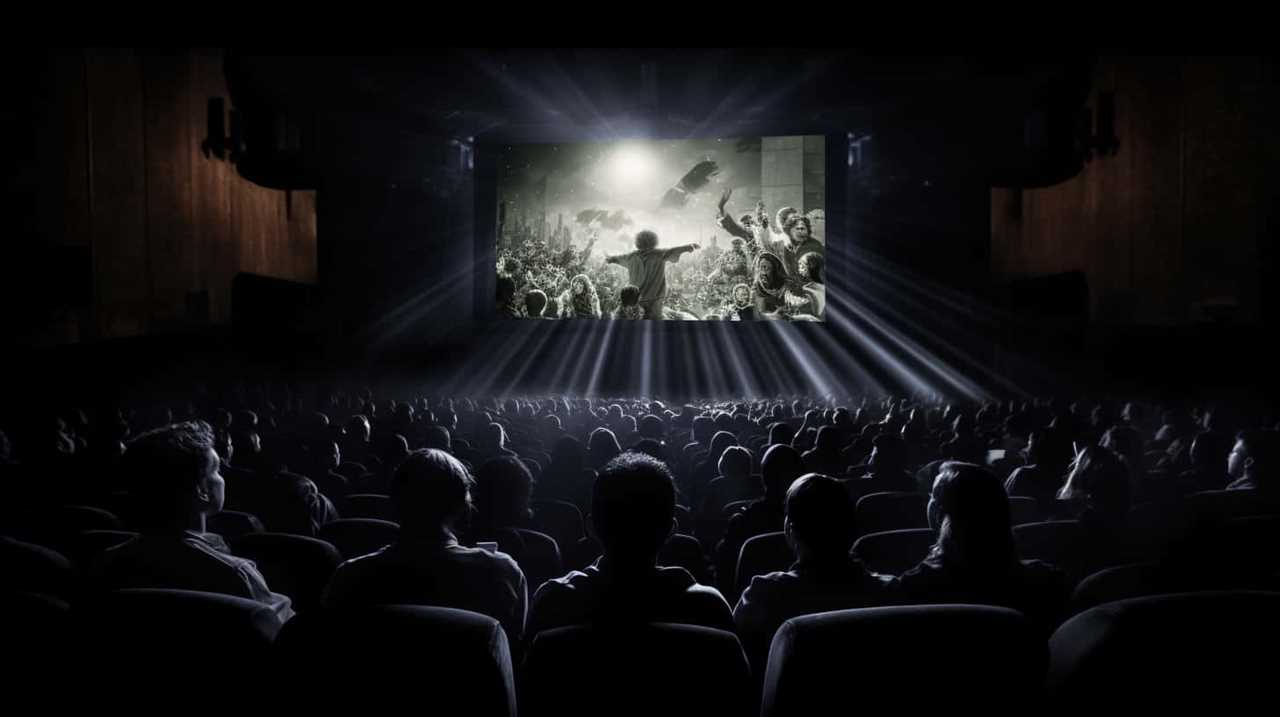As I delve into the captivating world of movies, I often discover myself drawn to those films that go beyond mere entertainment and delve into the realm of profound philosophical ideas.
These films, with their thought-provoking scripts and innovative storytelling, offer a unique and exhilarating experience for those seeking intellectual stimulation.
From exploring the nature of reality and identity in ‘The Matrix’ to contemplating the complexities of memory and existence in ‘Eternal Sunshine of the Spotless Mind,’ these eight cinematic masterpieces push the boundaries of imagination and challenge our fundamental beliefs.
Join me on this cinematic journey as we explore the depths of philosophical thought through the lens of these remarkable films.

Key Takeaways
- The Matrix and Eternal Sunshine of the Spotless Mind challenge our perception of reality and raise questions about the relationship between memory and identity.
- Blade Runner raises the question of what defines a human and explores the distinction between artificial and human consciousness, prompting ethical considerations about creating and treating artificial consciousness.
- Blade Runner also delves into the morality of genetic engineering and highlights the responsibility of creators towards artificially created beings.
- Inception questions the reliability of perception and explores the power of the subconscious, while Her challenges the genuineness of relationships and raises ethical concerns about AI development.
The Matrix: Exploring Reality and Identity
In my opinion, The Matrix is an exceptional film script that skillfully delves into the concepts of reality and identity. Through its gripping storyline and thought-provoking themes, the movie explores the idea of a reality simulation and the journey of self-discovery.
The film takes us on a thrilling ride, blurring the lines between what’s real and what’s virtual. It presents a world where humans are unknowingly trapped in a simulated reality created by machines. This concept challenges our perception of the world around us and forces us to question the nature of our own existence. The Matrix pushes us to ponder the boundaries of reality and the extent to which our lives may be shaped by external forces.
Furthermore, the film explores the theme of self-discovery in a profound and introspective manner. The protagonist, Neo, embarks on a journey to uncover his true identity and purpose. As the narrative unfolds, we witness Neo’s transformation from a confused individual to a self-actualized hero. This exploration of self-discovery resonates with audiences, as it reflects our own desire to understand ourselves better and find our place in the world.
Eternal Sunshine of the Spotless Mind: Memory and Existence
Continuing from the previous subtopic, another film script that delves into philosophical ideas is ‘Eternal Sunshine of the Spotless Mind’, which explores the themes of memory and existence. This thought-provoking film raises important questions about the nature of memory and its relationship to identity.

Here are three key ideas that make ‘Eternal Sunshine of the Spotless Mind’ a fascinating exploration of memory and existence:
- Memory and Identity: The film challenges the notion that memories define who we are. It questions whether erasing memories can truly separate us from our past experiences and shape our present and future selves.
- The Ethics of Erasing Memories: ‘Eternal Sunshine of the Spotless Mind’ forces us to consider the ethical implications of erasing memories. It asks whether it’s morally justifiable to erase painful or traumatic memories, or if doing so denies us the opportunity for growth and self-discovery.
- The Fragility of Existence: Through its narrative, the film highlights the fragility of human existence. It reminds us that memories, both good and bad, contribute to the richness and complexity of life. Erasing memories may offer temporary relief, but it also risks erasing a part of what makes us human.
Transition:
As ‘Eternal Sunshine of the Spotless Mind’ explores the themes of memory and existence, it leads us to ponder another philosophical question: What defines a human? This is the subject of the subsequent section on ‘Blade Runner’.
Blade Runner: What Defines a Human
Blade Runner, a thought-provoking film, raises the fundamental question of what truly defines a human.
As I reflect on the film, three key points come to mind.
Firstly, the defining characteristics of humanity, such as emotion, empathy, and self-awareness, are explored through the contrast between artificial beings, known as replicants, and humans.
Secondly, the film delves into the concept of consciousness, blurring the lines between artificial and human consciousness, challenging our preconceived notions of what it means to be alive.
Lastly, Blade Runner raises ethical concerns about the morality of creating life, prompting us to contemplate our responsibility as creators.

Humanity’s Defining Characteristics
The film Blade Runner explores the essence of humanity by questioning what truly defines a human. It delves into the complexities of human nature, existentialism, consciousness, reality vs. illusion, the meaning of life, the human condition, morality vs. immorality, and the nature of existence.
- Human nature: Blade Runner raises the question of whether humans are defined by their physical attributes or by their emotions, desires, and experiences.
- Existentialism: The film explores the existential crisis faced by both humans and replicants, forcing us to confront our own existence and the choices we make.
- Consciousness: Blade Runner challenges us to consider the nature of consciousness and whether it’s unique to humans or can be replicated.
Blade Runner’s exploration of these themes sets the stage for a thought-provoking examination of artificial vs. human consciousness.
Artificial Vs. Human Consciousness
As a film that delves into the philosophical question of what defines a human, Blade Runner prompts a thought-provoking exploration of the distinction between artificial and human consciousness. The movie raises the challenging issue of human vs. machine intelligence and forces us to question the boundaries of consciousness.
Are replicants, the artificial beings in the film, capable of experiencing emotions and self-awareness in the same way that humans do? This raises ethical concerns about the creation and treatment of artificial consciousness. Blade Runner highlights the potential consequences of creating beings with advanced intelligence but limited rights and freedoms.

The Morality of Creation
Continuing the exploration of the philosophical question of what defines a human, I ponder the morality of creation in the thought-provoking film Blade Runner. In this dystopian future, the ethics of genetic engineering and the role of technology in human evolution are brought to the forefront.
Here are three key points to consider:
- Playing the role of ‘creator,’ humans in Blade Runner engineer replicants – artificially created beings that closely resemble humans. This raises questions about the limits of our power and the responsibility that comes with it.
- The replicants, despite being created artificially, exhibit complex emotions and desires, blurring the line between what’s considered ‘human’ and what’s not. This challenges the traditional notion of humanity and raises questions about the essence of our existence.
- The film forces us to confront the consequences of our actions as creators. Are we justified in treating creations as mere objects, or do they possess inherent rights and dignity?
As we delve deeper into the morality of creation in Blade Runner, we’re led to further explore the nature of dreams and reality in the film Inception.
Inception: The Nature of Dreams and Reality
While exploring the nature of dreams and reality, I’m captivated by the film ‘Inception’. This mind-bending masterpiece directed by Christopher Nolan delves deep into the intricacies of the human mind and challenges our understanding of perception and the power of the subconscious.

One of the central themes in ‘Inception’ is the nature of perception. The film questions the reliability of our senses and explores the idea that what we perceive as reality may merely be a construction of our own minds. Through the concept of shared dreaming, the characters manipulate their perceptions and bend the boundaries of what’s real. This raises profound questions about the nature of our existence and the extent to which our perception shapes our reality.
Another fascinating aspect of ‘Inception’ is its exploration of the power of the subconscious. In the dream world, the subconscious takes on a tangible form, presenting itself as a formidable force that can either aid or hinder the characters’ objectives. The film highlights the profound influence that our unconscious thoughts and desires can have on our actions and choices in both dreams and waking life.
Through its thought-provoking narrative and stunning visuals, ‘Inception’ pushes the boundaries of storytelling and challenges our understanding of dreams and reality. It serves as a reminder that our perception of the world is subjective and that reality is a complex and multifaceted concept. As we delve into the depths of our own minds, we’re compelled to question the nature of our existence and the boundaries of our reality.
Her: Love, Artificial Intelligence, and Humanity
One of the most thought-provoking films that explores the themes of love, artificial intelligence, and humanity is ‘Her’.
This film, directed by Spike Jonze, takes us on a journey into a near-future world where a lonely writer named Theodore falls in love with an operating system named Samantha.
Love and consciousness: ‘Her’ challenges our understanding of love and asks us to consider whether a relationship between a human and an AI can be genuine. It delves into the idea that love isn’t limited by physical presence but can exist in a realm of consciousness.
Ethics of AI development: The film raises important ethical questions about the development and use of artificial intelligence. It prompts us to reflect on the potential consequences of creating AI systems that can emulate human emotions and form intimate connections. Are we prepared for the ethical implications of such technology?
Humanity: ‘Her’ also explores what it means to be human. As Theodore’s relationship with Samantha deepens, he begins to question his own humanity and the nature of human connection. The film invites us to contemplate the essence of our humanity and the role that technology plays in shaping our understanding of ourselves.

In ‘Her’, love, artificial intelligence, and humanity intertwine to create a captivating narrative that challenges our preconceptions and invites us to ponder the future of our relationships with technology. It serves as a poignant reminder of the complexities and moral dilemmas that arise as we continue to push the boundaries of AI development.
The Truman Show: The Illusion of Free Will
In the film ‘The Truman Show’, I explore the concept of free will and the illusion that surrounds Truman’s life. The nature of reality and the questioning of societal norms are central themes in this thought-provoking movie.
Truman Burbank, the protagonist, lives his entire life inside a massive television set, where every aspect of his existence is meticulously controlled, scripted, and broadcasted to the world. He’s unaware that his entire reality is an elaborate construct designed to keep him confined and ignorant of the truth.
Truman’s lack of free will becomes evident as he starts to question his surroundings and experiences strange occurrences that challenge the authenticity of his world. His curiosity and desire for freedom lead him on a journey of self-discovery, as he begins to unravel the illusion that has been carefully woven around him. This exploration of free will raises profound philosophical questions about the nature of reality and the extent to which societal norms can restrict individual agency.

‘The Truman Show’ serves as a powerful allegory for the constraints and illusions that society can impose upon individuals. It prompts us to question our own lives and the systems that govern them, urging us to break free from societal expectations and forge our own paths. As Truman bravely confronts the reality of his manufactured existence, we’re compelled to reflect on our own potential limitations and the choices we make within the confines of our own lives.
Through its compelling narrative and thought-provoking themes, ‘The Truman Show’ challenges us to examine the illusion of free will and the role of societal norms in shaping our lives. It invites us to contemplate the boundaries of our own reality and consider the possibilities that lie beyond them. This innovative film encourages us to question the nature of our existence and strive for true autonomy and self-determination.
Interstellar: Time, Space, and Human Destiny
Interstellar, directed by Christopher Nolan, delves into the concept of time as the fourth dimension and explores humanity’s cosmic significance. The film challenges our understanding of time and space, presenting a future where time travel becomes a possibility in order to save humanity.
Through its thought-provoking narrative, Interstellar raises questions about the nature of our existence, the limits of human knowledge, and our place in the vastness of the universe.

Time as Fourth Dimension
As a writer, I find the exploration of time as the fourth dimension in the film script ‘Interstellar: Time, Space, and Human Destiny’ to be thought-provoking and captivating. The concept of time travel has fascinated humanity for centuries, and ‘Interstellar’ takes this concept to new heights.
- Challenging philosophical concepts: The film delves into profound philosophical questions about the nature of time, our place in the universe, and the choices we make. It pushes us to ponder our existence and the impact of our actions.
- Emotional and intellectual engagement: ‘Interstellar’ balances its scientific and philosophical elements with a deeply emotional story. It invites us to invest in the characters’ journey and grapple with the moral dilemmas they face.
- Expanding our understanding: By presenting time as a fourth dimension, ‘Interstellar’ challenges our conventional understanding of reality. It forces us to contemplate the vastness of the universe and our place within it, igniting our imagination and pushing the boundaries of innovation.
Through its exploration of time as the fourth dimension, ‘Interstellar’ not only entertains but also provokes us to reflect on our existence and the mysteries of the universe. It’s a film script that embraces innovation and challenges our preconceived notions, leaving us inspired and in awe of the possibilities that lie beyond our grasp.
Humanity’s Cosmic Significance
Exploring the vastness of the universe, ‘Interstellar: Time, Space, and Human Destiny’ highlights the profound cosmic significance of humanity. The film invites us to contemplate the grandeur of the cosmos and our place within it, raising questions about human existence and our existential journey.
From a cosmic perspective, our lives may seem insignificant in the face of the vastness of space and time. However, the film also emphasizes the power of human connection and our ability to shape our own destiny. It reminds us that despite our smallness in the universe, our choices and actions can have a lasting impact on the course of humanity.

In this way, ‘Interstellar’ challenges us to reflect on our purpose and the meaning we can find in our brief existence.
Transitioning into the subsequent section about ‘the tree of life: reflections on existence and purpose’, we continue to delve into the philosophical ideas presented in film scripts.
The Tree of Life: Reflections on Existence and Purpose
In ‘The Tree of Life’, Terrence Malick explores the fundamental questions of existence and purpose through a captivating and thought-provoking narrative. This film delves deep into the realms of existential introspection and metaphysical exploration, leaving viewers with a profound sense of contemplation and wonder.
Here are three key aspects that make ‘The Tree of Life’ a remarkable exploration of existence and purpose:

- Visual Poetry: Malick’s masterful use of imagery and symbolism creates a visually stunning and poetic experience. From the breathtaking shots of nature to the intimate moments of human connection, every frame is meticulously crafted to evoke a sense of awe and provoke existential contemplation.
- Narrative Structure: The film weaves together multiple layers of storytelling, seamlessly blending the personal and the cosmic. Through the lens of a Texas family in the 1950s, ‘The Tree of Life’ explores the interconnectedness of all life and raises questions about our place in the universe.
- Philosophical Themes: The film tackles profound philosophical questions about the meaning of life, the nature of suffering, and our relationship with the divine. Through introspective voiceovers and philosophical musings, ‘The Tree of Life’ invites viewers to reflect on their own existence and purpose.
‘The Tree of Life’ is a cinematic masterpiece that pushes the boundaries of storytelling and challenges viewers to contemplate the mysteries of existence. It’s a must-watch for anyone seeking a thought-provoking and visually stunning exploration of life’s fundamental questions.
Frequently Asked Questions
How Does the Matrix Challenge Traditional Notions of Reality and Identity?
The Matrix challenges traditional notions of reality and identity by challenging perceptions and questioning the nature of our existence. It forces us to question what is real and who we truly are, pushing the boundaries of our understanding.
What Role Does Memory Play in Shaping Our Existence in Eternal Sunshine of the Spotless Mind?
Memory plays a crucial role in shaping our existence in "Eternal Sunshine of the Spotless Mind." It explores the profound impact of memories on our emotions and our understanding of the self.
How Does Blade Runner Explore the Question of What Defines a Human Being?
Blade Runner explores the question of what defines a human being by depicting a future where the line between humans and replicants is blurred. It challenges us to ponder what makes us truly human and how our creations reflect our own humanity.

In Inception, What Insights Does the Film Offer About the Nature of Dreams and Reality?
Inception offers profound insights into the nature of dreams and reality. It delves into the depths of the subconscious, challenging our perception of what is real and blurring the lines between the conscious and the unconscious mind.
How Does the Film Her Explore the Themes of Love, Artificial Intelligence, and Humanity?
In "Her," the exploration of consciousness and the complexities of human-AI relationships are beautifully depicted. Through the lens of love and artificial intelligence, the film delves into profound questions about the nature of humanity and our connection to technology.
Can the Philosophical Ideas Explored in Film Scripts Impact the Essence of Existence?
Great minds in film have delved into the depths of human existence, exploring existential questions through the medium of cinema. Some of the best films exploring existence offer profound insights into the nature of being, challenging viewers to ponder their own purpose and place within the universe.
Conclusion
In conclusion, these eight film scripts have masterfully delved into philosophical ideas, leaving audiences questioning the nature of reality, identity, memory, and existence.
Through thought-provoking narratives and captivating characters, these films explore profound concepts such as the definition of humanity, the power of dreams, the boundaries of love, and the illusory nature of free will.

They challenge us to reflect on our own existence and purpose, inviting us to ponder the deeper truths that lie beyond the surface of our everyday lives.
Lauren’s talent in writing is matched by her passion for storytelling. Her love for books and deep understanding of culture and entertainment add a distinct flavor to her work. As our media and press contact, Lauren skillfully bridges the gap between afterQuotes and the broader media landscape, bringing our message to a wider audience.










